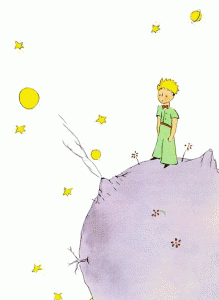Several years ago when the father dear and I were perusing a second-hand bookstore, he came across Antoine de Saint-Exupery’s The Little Prince. He told me that he had been forced to read the book when he was in grade school, and that he had disliked it based on the excessive amounts of analysis that the teacher had instructed the class to do. Even with this memory, however, the father dear bought the book for me – I cannot recall, now, whether he bought it because he thought that I would truly enjoy the story, or if he bought it because it’s one of those books that everyone “should” read.

Regardless of the reason behind the gift, I did indeed read the small book (which can be finished in the space of a few hours), and I enjoyed it immensely. There is something very sweet, sorrowful, and real about The Little Prince and the characters in it. Here are some of the real-life lessons we can take away from this strange and compelling novella:
1) “Growing up” doesn’t mean we have to lose perspective. As many people get older, they tend to become more set in their ways and value system. This, however, inhibits further growth, because it prevents us from seeing other points of view and from taking the time to slow down, really see the world, and enjoy ourselves. Adults may reach their peak physically, but mentally we should strive to continue our education (academically and/or from life experience).
2) Something may still be of “great consequence” to someone else, even if it is meaningless to you. That is what makes us all different, special, and unique. That is what enables us to connect with and relate to others and share our knowledge of the world. It’s something to keep in mind when we encounter people with vastly different opinions from our own.
3) As with the baob trees overtaking small planets that the little prince is witness to, we should all be aware of “bad seeds”. Continual maintenance of soil is necessary to stamp out bad seeds and cultivate good ones – just the same as we should cultivate that which is positive and healthy, and do what we can to prevent poor habits from developing.
4) We form our understandings of the world based on our experiences from and impressions of it. Thus one person may see the world entirely different from another – and thus we may have problems of miscommunication. We need to anticipate potential problems so as to deal with them immediately when they arise.
5) Too much time spent agonizing over money or careers or to-do lists will run us down and prevent us from appreciating life and the relationships that we have. As the fox in The Little Prince says, “…there is no shop anywhere where one can buy friendship, and so men have no friends anymore.” (65). Put love first.
Have you read The Little Prince? Is there another book you’ve read recently that you extracted some life lessons from? Share in the comments below.
Sounds lovely!